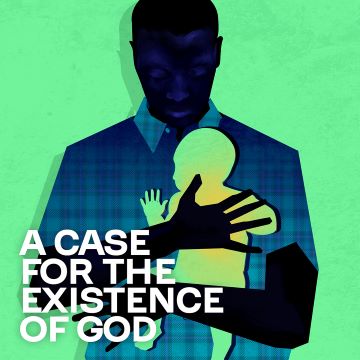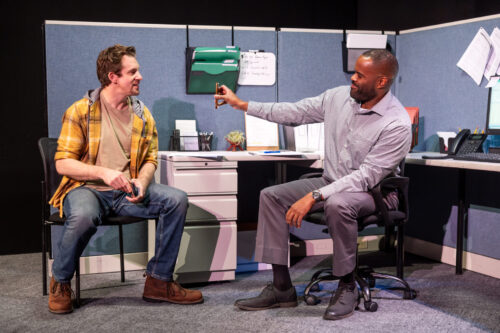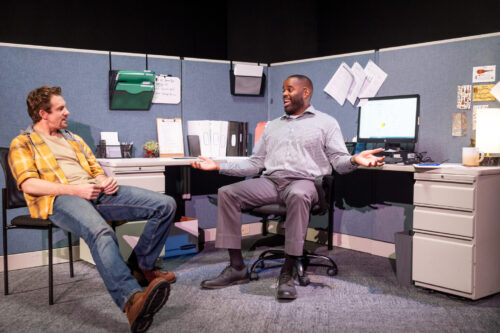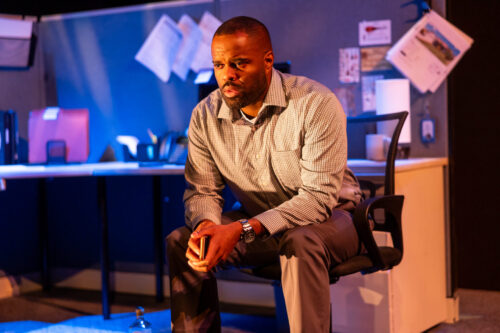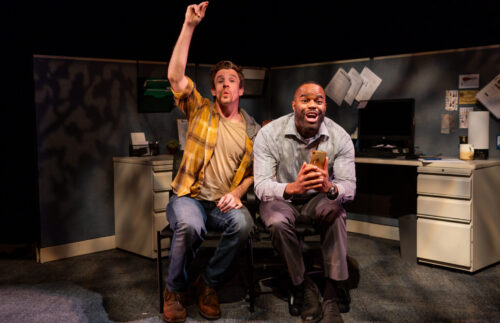A CASE FOR SEEING THIS PLAY
Toward the end of A Case for the Existence of God (named Best Play of the 21–22 Season by the New York Drama Critics’ Circle), I tried to recall what I had learned in grad school about Aristotle and his theory of catharsis. Full disclosure: I had to look it up, because my memory is hazy. Here it is in an imperfect nutshell: according to Aristotle, a tragedy causes the purgation (or catharsis) of pity and fear that leads to a purification.
Playwright Samuel D. Hunter’s tightly-written script carries us through the ups and downs of a complex and moving relationship between two single dads — Ryan (Jesse Hinson) a straight, white, poor high school grad and Keith (De’Lon Grant) a gay, Black, middle-class Early Music major — because they share, in the words of Ryan, “a specific kind of ’” sadness.” The friendship between the two proceeds through stops and starts, affection and rage, disclosure and withdrawal. Each man wants something, and each man recognizes the pain of that wanting.
The play unfolds around the most mundane and irritating of projects: Ryan wants a mortgage and Keith is a mortgage broker. Ryan is completely lacking not only in financial resources, but also in financial literacy. Keith, a man who loves words that Ryan doesn’t even know, tries to walk this man — with whom he shares little — through what he calls the “convoluted” financial system. Their journey together leads them to an exploration of fatherhood, desperation, family, adoption, friendship, and divorce.
The acting is terrific. Throughout the show I found myself wondering whether Hinson or Grant was the “better” actor until I realized that the strength of their performance was that they were doing it together. Director Melinda Lopez likely deserves much credit for eliciting such exciting performances as well as making this two-hander work like the well-played polyphony that it is. Polyphony, Keith explains to Ryan during a bout of all-night drinking, means “two different melodies being played at the same time that complement each other harmonically.” This, of course, is a perfect description for this play.
Lights (Elmer Martinez) and sound (Aubrey Dube) move us through many weeks and even a couple of decades with little more than a dimming or a flicker, departing from Cristina Todesco’s Twin Falls, Idaho office cubicle set only at the very end of the show.
To be clear, despite my thoughts about Aristotle, A Case for the Existence of God is not a tragedy. Some very sad things happen, so sad that they caused me to purge some emotions through tears, but these sad events do not close the play. As the title implies, the play ends on a note of hope. “I have faith,” Ryan tells Keith, and Keith asks, “Faith in what?” “In things working out,” Ryan responds.
Things do indeed “work out,” though not in the way that either man hopes. Nonetheless, Ryan’s faith is justified.
Maybe that is all the God we need.
photos by Nile Scott Studios
A Case for the Existence of God
SpeakEasy Stage Company
Stanford Calderwood Pavilion
Boston Center for the Arts, 527 Tremont St in Boston’s South End
ends on February 17, 2024
for tickets (starting at $25), call 617.933.8600 or visit SpeakEasyStage
